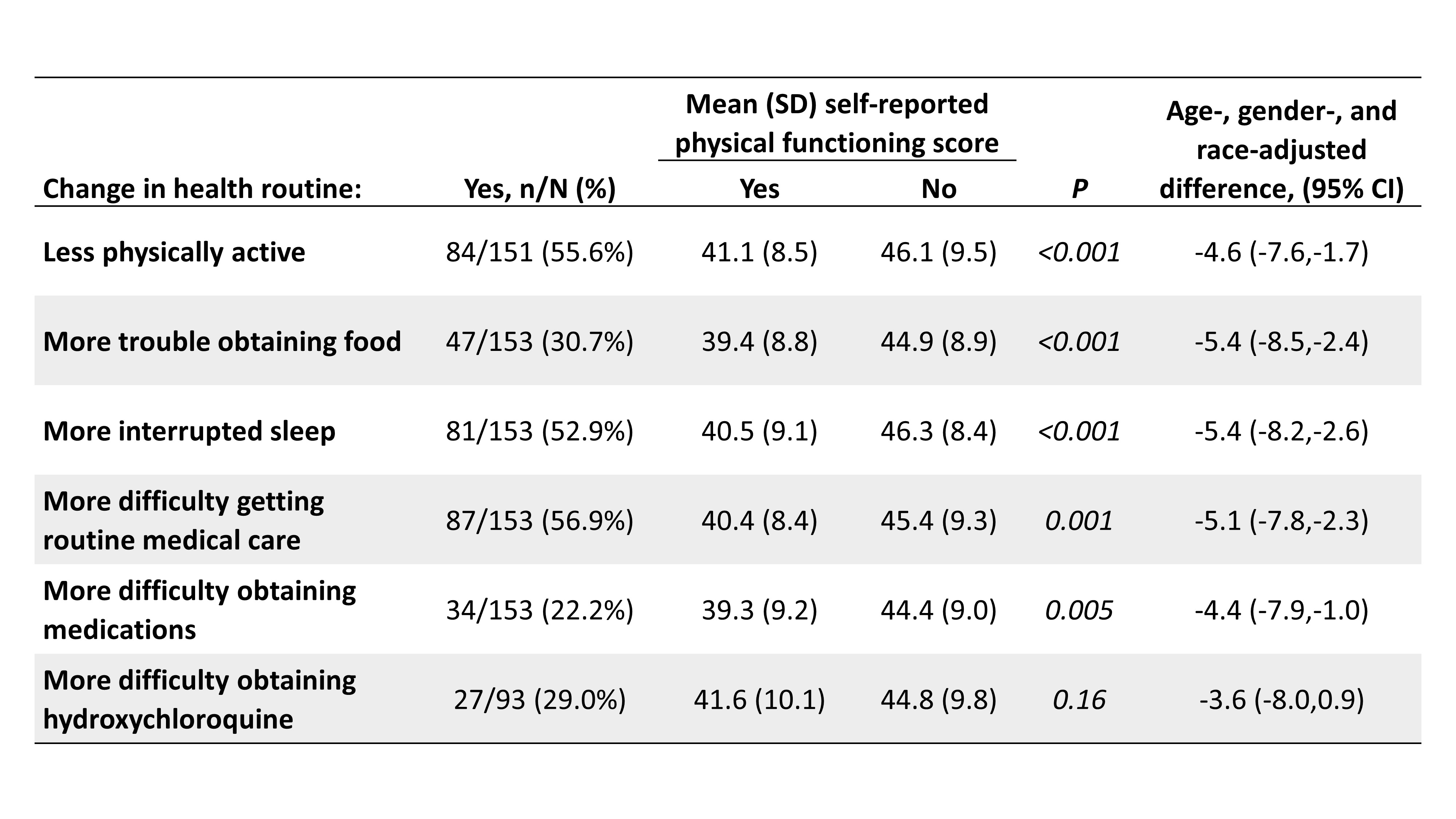Session Information
Date: Tuesday, November 9, 2021
Title: Patient Outcomes, Preferences, & Attitudes Poster IV: COVID-19 (1589–1613)
Session Type: Poster Session D
Session Time: 8:30AM-10:30AM
Background/Purpose: The COVID-19 pandemic was disruptive to individual health routines. Changes in health routines may worsen disease management and reduce opportunities for physical activity, both of which may affect physical functioning. Leveraging on an ongoing ancillary cohort study [Approaches to Positive, Patient-centered Experiences of Aging in Lupus (APPEAL)], we examined whether pandemic-related changes in health routines were associated with self-reported physical functioning among individuals with systemic lupus erythematosus (SLE).
Methods: APPEAL subjects were recruited from Georgians Organized Against Lupus (GOAL), a population-based cohort of individuals with validated SLE in metropolitan Atlanta. A total of 153 participants (mean age, 48 years; 95% female, 76% Black) were consented (10/6/2020-5/4/2021) for a single visit during the period the COVID-19 survey was administered. Responses to items regarding pandemic-related changes in health habits (changes in activity, difficulty in obtaining food or medications and in obtaining routine medical care) were dichotomized as yes vs. no. Raw physical functioning scores were captured via the PROMIS Physical Functioning-Short Form 12a and converted to t-scores (50 = average score for a general adult population; differences of 10 = 1 SD; and higher scores = better physical functioning). Differences in scores were assessed via t tests and age-, gender-, and race-adjusted linear regression models.
Results: More than half of participants reported being less physically active, having more interrupted sleep, and more difficulty getting routine medical care as a result of the pandemic; nearly one-third reported having more trouble obtaining food, and nearly one-quarter reported difficulty in obtaining medications (Table). The overall mean physical functioning t-score (SD) was 43.2 (9.2). Scores were consistently lower (by ~0.5 SD) for those who reported declines in health routines, and the differences were statistically significant for all items except difficulty obtaining hydroxychloroquine; adjustment for age, gender, and race did not substantially change the associations (Table).
Conclusion: While the cross-sectional nature of the study precludes causal inference, our results suggest that experiencing pandemic-related disruptions in health routines was associated with meaningfully lower perceptions of physical functioning. Future studies should explore whether this association persists over time and whether lower perceived functioning is associated with long-term health outcomes.
To cite this abstract in AMA style:
Plantinga L, Hoge C, Bowling C, Dunlop-Thomas C, Pearce B, Lim S, Drenkard C. COVID-19 Pandemic-Related Changes in Health Routines and Self-Reported Physical Functioning Among Systemic Lupus Erythematosus Patients [abstract]. Arthritis Rheumatol. 2021; 73 (suppl 9). https://acrabstracts.org/abstract/covid-19-pandemic-related-changes-in-health-routines-and-self-reported-physical-functioning-among-systemic-lupus-erythematosus-patients/. Accessed .« Back to ACR Convergence 2021
ACR Meeting Abstracts - https://acrabstracts.org/abstract/covid-19-pandemic-related-changes-in-health-routines-and-self-reported-physical-functioning-among-systemic-lupus-erythematosus-patients/

